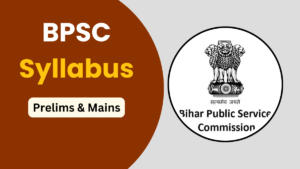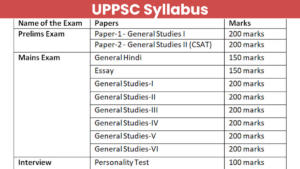Table of Contents
JKPSC KAS Syllabus 2024: The Jammu and Kashmir Public Service Commission (JKPSC)had issued a notification to fill 90 state government vacancies through the Kashmir Administrative Service (KAS) exam. Along with this notification, the JKPSC also released a detailed KAS syllabus in PDF format on its official website. Here we have decode the JKPSC syllabus, candidates preparing for the JKPSC KAS Exam 2024 can check the complete JKPSC Syllabus and Exam pattern here in this article.
Quick JKPSC Syllabus 2024 Updates
- JKPSC KAS Examination’s new syllabus is discussed below for candidates so that they can prepare accordingly.
- Candidates can get more details like the JKPSC Exam Date and eligibility criteria.
- We have explained both the Prelims and Mains exam curriculum, including the exam pattern as per the 2024 JKPSC Exam Syllabus.
JKPSC New Syllabus 2024
The Jammu and Kashmir Public Service Commission (JKPSC) will conduct the Kashmir Administrative Service (KAS) examination in 2024. The commission has made the new JKPSC syllabus available on its official website for aspiring candidates. Understanding the exam pattern and the new syllabus is crucial before beginning your preparation. In this article, you can access the most up-to-date JKPSC syllabus and download it in PDF format.
JKPSC KAS Syllabus Overview
JKPSC, which stands for Jammu and Kashmir Public Service Commission, conducts civil service exams for various roles in Jammu and Kashmir’s administrative, police, medical, and accounting services. The JKPSC KAS Syllabus 2024 can be checked from the official website. Candidates should get the minimum marks, i.e., they are required to clear the JKPSC KAS Cut-off in the prelims exam to be eligible for the next level, i.e., the Mains exam. The JKPSC KAS Exam is divided into three stages:
- Preliminary exam
- Main exam
- Interviews
JKPSC KAS Syllabus 2024 PDF
It is well known that JKPSC KAS 2024 will consist of three stages Prelims, Mains and Interview. The topic-wise Syllabus will help the aspirants know what topics will be asked in the examination. Candidates must follow the JKPSC KAS Syllabus and Exam Pattern given here to maximize their score in the KAS Exam. Candidates should not miss this chance and prepare rigidly for it.
Please click the link below to find the detailed Jammu Kashmir PSC KAS Syllabus and Exam Pattern.
| Jammu Kashmir PSC KAS Syllabus PDF | |
| Category | Link |
| JKPSC KAS Syllabus 2024 | |
JKPSC KAS Exam Pattern 2024
- It’s important to note that this exam primarily serves as a screening test.
- The scores from the Preliminary Examination will be considered solely for shortlisting candidates for the Main examination.
| JKPSC KAS Prelims Overview | |
| Conducting Body | Jammu and Kashmir Public Service Commission (JKPSC) |
| Exam | Kashmir Administrative Service (KAS) |
| Exam Mode | Offline |
| Exam Type | Objective Type Questions |
| Total Questions | Paper I- 100
Paper II- 100 |
| Total Marks | Paper I-200 Marks
Paper II-200 Marks |
| Marking Scheme | +2 for every correct answer |
JKPSC KAS Prelims Syllabus 2024
- The candidate must appear in both the Papers of Combined Competitive (Preliminary) Examination for evaluation otherwise he/she will be disqualified in case he/she does not appear in both the papers of the Combined Competitive (Preliminary) Examination. Check the JKPSC KAS Prelims Syllabus in this section.
| JKPSC KAS Prelims Syllabus 2024 | |
| Paper | Topics |
| General Studies Paper-I |
|
| General Studies Paper-II |
|
Note: Paper–II of the Combined Competitive Prelims Exam will be a qualifying paper with a minimum qualifying mark of 33%.
JKPSC KAS Mains Exam Pattern 2024
The Main Examination has two parts: a written test and a Personality Test (Interview). The written test involves eight essay-type papers, with one paper meant for qualification purposes. For more details, candidates can check the following table.
| JKPSC KAS Mains Exam Pattern Overview | |
| Paper | Marks |
| English | 300 |
| Paper I | 250 |
| Paper II | 250 |
| Paper III | 250 |
| Paper IV | 250 |
| Paper V | 250 |
| Paper VI | 250 |
| Paper VII | 250 |
| Total | 2050 |
English paper marks are not accounted for final merit.
JKPSC KAS Mains Syllabus
The pattern of questions would be broad as follows:
- Comprehension of given passages.
- Precis Writing.
- Usage and Vocabulary.
- Short Essays.
(The paper will be of Matriculation or equivalent standard and will be qualifying only. The marks obtained in this paper will not be counted for the final ranking.)
Paper I – Essay
Paper II – General Studies-I: Indian Heritage and Culture, History and Geography of the World and Society.
- Indian culture will cover the salient aspects of Art Forms, Literature, and Architecture from ancient to modern times.
- Modern Indian history from about the middle of the eighteenth century until the present- significant events, personalities, and issues.
- The Freedom Struggle – its various stages and important contributors/contributions from different parts of the country.
- Post-independence consolidation and reorganization within the country.
- History of the world will include events from the 18th century such as the Industrial Revolution, world wars, redrawing of national boundaries, colonization, decolonization, political philosophies like communism, capitalism, socialism, etc.- their forms and effects on society.
- Salient features of Indian Society, Diversity of India.
- Role of women and women’s organization, population and associated issues, poverty and developmental issues, urbanization, their problems, and their remedies.
- Effects of globalization on Indian society
- Social empowerment, communalism, regionalism & secularism.
- Salient features of the world’s physical geography.
- Distribution of key natural resources across the world (including South Asia and the Indian subcontinent); factors responsible for the location of primary, secondary, and tertiary sector industries in various parts of the world (including India).
- Important Geophysical phenomena such as earthquakes, tsunamis, Volcanic activity, cyclones, etc., geographical features and their location changes in critical geographical features (including water bodies and icecaps), and flora and fauna and the effects of such changes.
Paper III – General Studies-II: Governance, Constitution, Polity, Social Justice, and International Relations.
- Indian Constitution- historical underpinnings, evolution, features, amendments, significant provisions, and basic structure.
- Functions and responsibilities of the Union and the States, issues and challenges about the federal structure, devolution of powers and finances up to local levels, and challenges therein.
- Separation of powers between various organs disputes redressal mechanisms and institutions.
- Comparison of the Indian constitutional scheme with that of other countries.
- Parliament and State Legislatures – structure, functioning, conduct of business, powers & privileges, and issues arising out of these.
- Structure, organization, and functioning of the Executive and the Judiciary
- Ministries and Departments of the Government; pressure groups and formal/informal associations and their role in the Polity.
- Salient features of the Representation of People’s Act.
- Appointment to various Constitutional posts, powers, functions, and responsibilities of various Constitutional Bodies.
- Statutory, regulatory, and various quasi-judicial bodies.
- Government policies and interventions for development in various sectors and issues arising out of their design and implementation.
- Development processes and the development industry – the role of NGOs, SHGs, various groups and associations, donors, charities, institutional and other stakeholders.
- Welfare schemes for vulnerable sections of the population by the Centre and States and the performance of these schemes; mechanisms, laws, institutions, and Bodies constituted for the protection and betterment of these vulnerable sections.
- Issues relating to the development and management of Social Sector/Services relating to Health, Education, and Human Resources.
- Issues relating to poverty and hunger.
- Important aspects of governance, transparency and accountability, e-governance- applications, models, successes, limitations, and potential; citizens charters, transparency & accountability, and institutional and other measures.
- Role of civil services in a democracy.
- India and its neighborhood- relations.
- Bilateral, regional, and global groupings and agreements involving India and/or affecting India’s interests.
- Effect of policies and politics of developed and developing countries on India’s interests, Indian diaspora.
- Important International institutions, agencies, and fora- their structure, mandate.
Paper IV – General Studies-III: Technology, Economic Development, Bio diversity, Environment, Security and Disaster Management.
- Indian Economy and issues relating to planning, mobilization of resources, growth, development, and employment.
- Inclusive growth and issues arising from it.
- Government Budgeting.
- Major crop cropping patterns in various parts of the country, different types of irrigation and irrigation systems storage, transport and marketing of agricultural produce and issues and related constraints; e-technology in the aid of farmers.
- Issues related to direct and indirect farm subsidies and minimum support prices; Public Distribution System- objectives, functioning, limitations, revamping; issues of buffer stocks and food security; Technology missions;
- economics of animal-rearing.
- Food processing and related industries in India – scope and significance, location, upstream and downstream requirements, supply chain management.
- Land reforms in India.
- Effects of liberalization on the economy, changes in industrial policy, and their effects on industrial growth.
- Infrastructure: Energy, Ports, Roads, Airports, Railways etc.
- Investment models.
- Science and technology- developments and their applications and effects in everyday life.
- Achievements of Indians in science & technology; indigenization of technology and development of new technology.
- Awareness in the fields of IT, Space, Computers, robotics, nano-technology, bio-technology, and issues relating to intellectual property rights.
- Conservation, environmental pollution, and degradation, environmental impact assessment.
- Disaster and disaster management.
- Linkages between development and spread of extremism.
- Role of external state and non-state actors in creating challenges to internal security.
- Challenges to internal security through communication networks, the role of media and social networking sites in internal security challenges, basics of cyber security money-laundering and its prevention.
- Security challenges and their management in border areas; linkages of organized crime with terrorism.
- Various Security forces and agencies and their mandate.
Paper V – General Studies-IV: Ethics, Integrity, and Aptitude.
This paper will include questions to test the candidates’ attitudes and approach to issues relating to integrity, probity in public life, and problem-solving approaches to various issues and conflicts faced in dealing with society. Questions may utilize the case study approach to determine these aspects. The following broad areas will be covered.
- Ethics and Human Interface: Essence, determinants and consequences of Ethics in human actions; dimensions of ethics; ethics in private and public relationships. Human Values – lessons from the lives and teachings of great leaders, reformers, and administrators; the role of family, society, and educational institutions in inculcating values.
- Attitude: content, structure, function; its influence and relation with thought and behavior; moral and political attitudes; social influence and persuasion.
- Aptitude and foundational values for Civil Service, integrity, impartiality and non-partisanship, objectivity, dedication to public service, empathy, tolerance, and compassion towards the weaker sections.
- Emotional intelligence concepts, and their utilities and application in administration and governance.
- Contributions of moral thinkers and philosophers from India and the world.
- Public/Civil Service Values and Ethics in Public Administration: Status and problems; ethical concerns and dilemmas in government and private
- institutions; laws, rules, regulations, and conscience as sources of ethical guidance; accountability and ethical governance; strengthening of ethical and moral values in governance; ethical issues in international relations and funding; corporate governance.
- Probity in Governance: Concept of public service; Philosophical basis of governance and probity; Information sharing and transparency in government, Right to Information, Codes of Ethics, Codes of Conduct,
- Citizen’s Charters, work culture, Quality of service delivery, Utilization of public funds, challenges of corruption.
- Case Studies on the above issues.
Paper VI and Paper VII – Optional Subject Paper I & II
Candidates may choose any optional subject from amongst the list of subjects given below:
List of Subjects (Optional) Here is the list of optional subjects as per the syllabus of JKPSC KAS 2024-
- Agriculture
- History
- Mathematics
- Medical science
- Political Science & International Relations;
- Zoology
- Anthropology
- Chemistry
- Botany
- Commerce and Accountancy
- Electrical Engineering
- Geology
- Animal Husbandry and Veterinary Science
- Civil Engineering
- Economics
- Geography
- Philosophy
- Sociology
- Arabic, Dogri, English, Hindi, Kashmiri, Persian, Punjabi, Sanskrit, and Urdu
- Law
- Management
- Mechanical Engineering
- Physics
- Psychology
- Public Administration
- Statistics
| JKPSC KAS Related Articles | |
| JKPSC KAS Salary | JKPSC KAS Previous Question Paper |


 BPSC Syllabus 2024: Exam Pattern For Pre...
BPSC Syllabus 2024: Exam Pattern For Pre...
 UPPSC Syllabus 2024: Prelims and Mains E...
UPPSC Syllabus 2024: Prelims and Mains E...
 MPSC Syllabus 2024 for Prelims and Mains...
MPSC Syllabus 2024 for Prelims and Mains...







